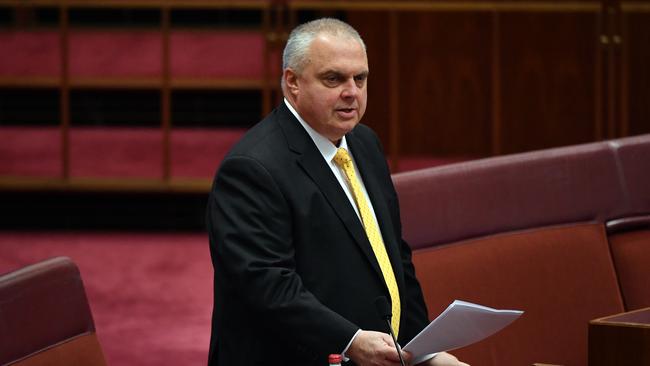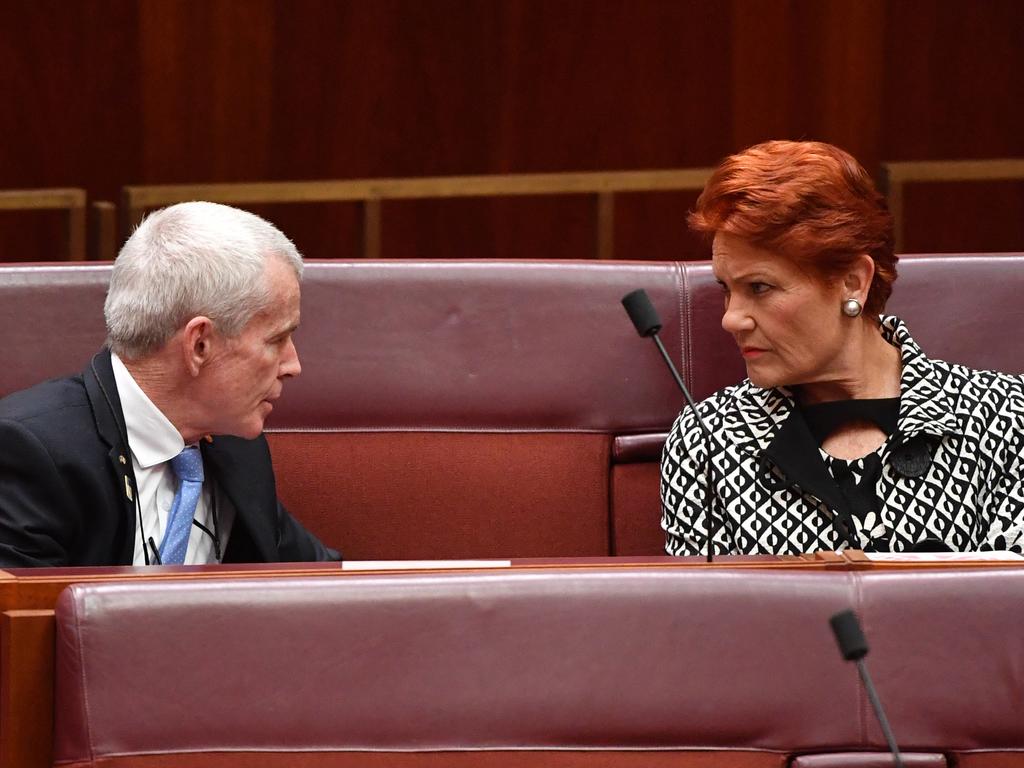‘Massive job loss’ warning to crossbench over Industrial Relations bill
Failure to support the government’s IR bill will force businesses to collapse, costing jobs that could be saved, experts warn.

Business has urged the government to oppose Senate crossbench proposals giving workers more rights to arbitration while warning that defeat of the industrial relations bill will “crush confidence and devastate employment” as JobKeeper ends.
With the government trying to secure the votes of One Nation and Centre Alliance’s Stirling Griff to get the bill passed this week, Australian Industry Group chief executive Innes Willox said the Coalition should resist giving enhanced powers to the Fair Work Commission.
Senator Griff has called for the government to support changes recommended by the Law Council of Australia including giving casual workers access to arbitration by the commission where an employer denied a request to convert to permanent employment.
The proposal, backed by the union movement, had not been supported by the government but the Law Council said the change would prevent employers unreasonably denying a request from a casual.
The Law Council also called for the commission to be able to arbitrate employment condition disputes for workers covered by eight year greenfield agreements; arbitrate disputes about flexible work directions and disputes over wage underpayment claims of up to $50,000.
Mr Willox said giving the commission the power to arbitrate underpayment claims, other than by consent, would breach the separation of powers in the Australian Constitution as determined in the High Court’s Boilermakers Case in 1956.
“The High Court held that the predecessor tribunal to the FWC could not exercise judicial powers because these powers can only be exercised by a relevant court,” he said.
“The commission does not have the power to order employers to make back-payments and it cannot impose penalties. The relevant provisions in the Constitution have not changed since 1956.”
He said exposing employers to compulsory arbitration of casual conversion requests was not necessary as the existing award clauses allowing for arbitration by consent had proven to be effective.
Mr Willox said the Ai Group’s member advice line this week had seen a significant jump in businesses calling about potential redundancies as the end of JobKeeper approached.
“The passage of the bill this week is vital and its rejection would not come at a worse time,” he said.
“A defeat of the bill will crush confidence, devastate current and future employment, particularly impact small and family-owned Australian businesses and completely undercut our prospects of a quick recovery.
“Business owners - and those who work with them - will not forget those who campaigned against the interests of our national economic recovery, nor those who choose to vote against that recovery.
He accused unions of running a misinformation campaign and endeavouring to pressure crossbench senators not to support the Bill, or pressuring them to demand unreasonable amendments that cannot be supported.
“They are attempting to intimidate crossbenchers by putting their photographs in full page newspaper advertisements and on posters. It is important that crossbench senators act in the national interest and not respond to these blatant attempts to intimidate them,” he said.
Senate debate on the bill has resumed but the government is not expected to bring on a vote on Tuesday while negotiations continue with the crossbench over amendments.
Crossbenchers Rex Patrick and Jacqui Lambie, who want a Senate vote delayed until May, have submitted amendments that remove all sections of the bill, with the exception of union-backed compliance proposals to address underpayment of workers.
The proposal is opposed by the government which remains cautiously optimistic of reaching agreement with One Nation. If successful, it will try to get an agreement with Senator Griff and bring on a vote before the Senate rises this week.
One Nation wants changes to the bill’s casual provisions and says casuals should be able to seek permanent employment after six months of regular work rather than 12 months.
Insolvency experts weaned on Tuesday that failure by the Senate to pass the industrial relations bill would force a significant number of at-risk businesses into collapse, costing a “massive number of jobs that could otherwise be saved”.
In a letter to Treasurer Josh Frydenberg, the professional body for restructuring, insolvency and turnaround experts said on Tuesday that already distressed businesses would be at a higher risk of insolvency if the bill was not supported by the Senate cross bench.
The government’s bill seeks to prevent employers from being exposed to billions of dollars in backpay. It would allow employers to offset previously paid casual loadings against a leave claim by a casual found to be permanent by a court.
The government says the changes will give certainty to employers who faced a “massive liability” of up to $39bn due to Federal Court decisions that workers on regular casual shifts were entitled to seek paid leave.
Australian Restructuring Insolvency and Turnaround Association chief executive John Winter said his members were concerned that the impact of the court decisions “unquestionably places already distressed business at a much higher risk of insolvency”.
He noted the “well-founded view” that many businesses may face a potential backpay liability to all casuals that they employed for more than a single shift in the past 6 years, notwithstanding that they paid an additional casual loading in accordance with awards and agreements.
While supporting the government’s efforts through the bill to address the “serious anomalies” created by the court decisions, he said “we remain very concerned that failure to address these issues will force a significant number of at-risk businesses into insolvency, especially in the current environment, and at the cost of a massive number of jobs that could otherwise be saved”.
He said a failure to support changes addressing the court decisions could result in a significant number of the small and medium sized businesses being stopped from accessing the government’s small business restructuring reforms.
Access to the reforms require all employee entitlements to be paid but a business could find itself with a bill for backpay of 6 years of leave, holiday and redundancy entitlements to casual employees.
“This risk is likely to be the greatest in sectors that have been hardest hit by the pandemic: hospitality, tourism, retail, events and the arts,” he said. “And, of course, these sectors are also some of the largest employers of casuals and so their risk is multiplied.”
Low wage growth concerns
Australian Council of Social Services chief executive Cassandra Goldie said the peak body was committed to protecting employment conditions for low-wage workers.
“We stand with the Australian Council of Trade Unions in terms of their deep concerns with what’s happening to the industrial relations legislation,” she told The Australian.
“We’ve got a serious problem with low wage growth. The more that we create industrial relations conditions that allow for less security of work, less permanency of arrangements, it drives down wages. This is not an either-or.”






